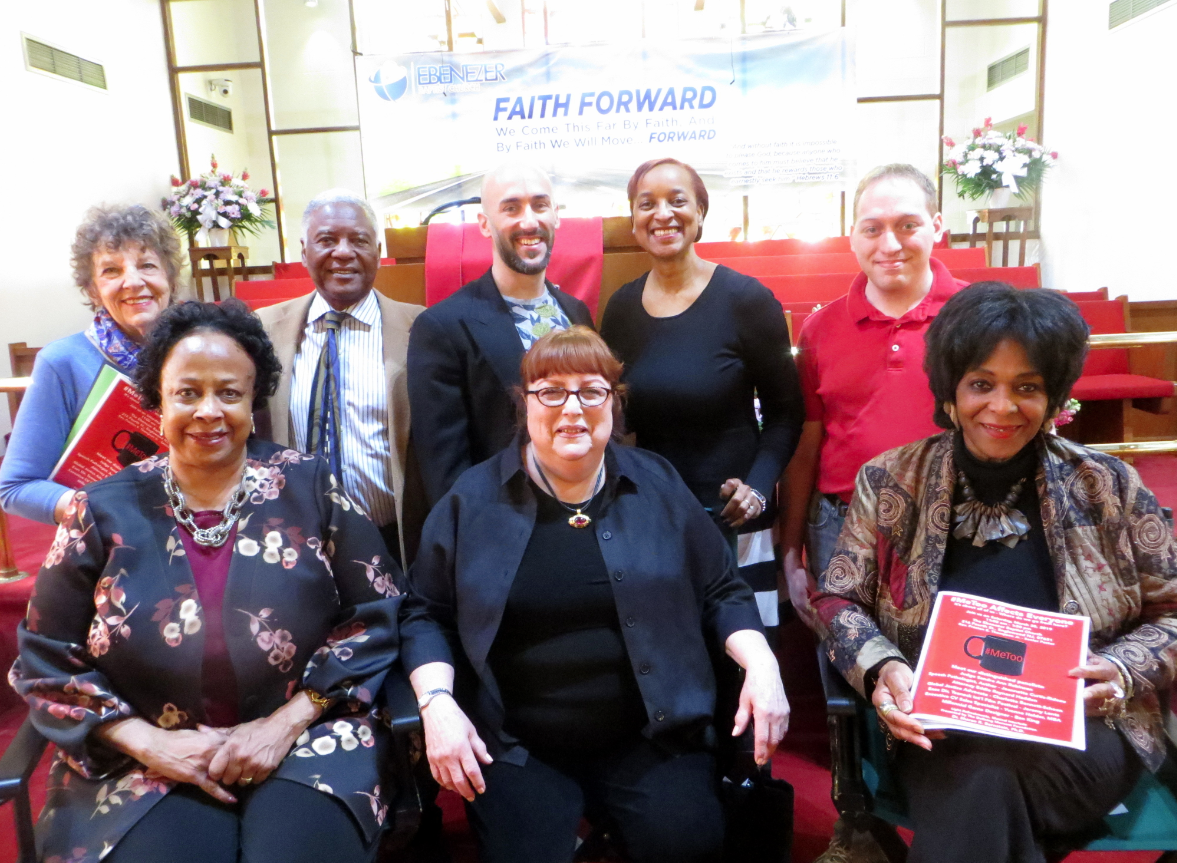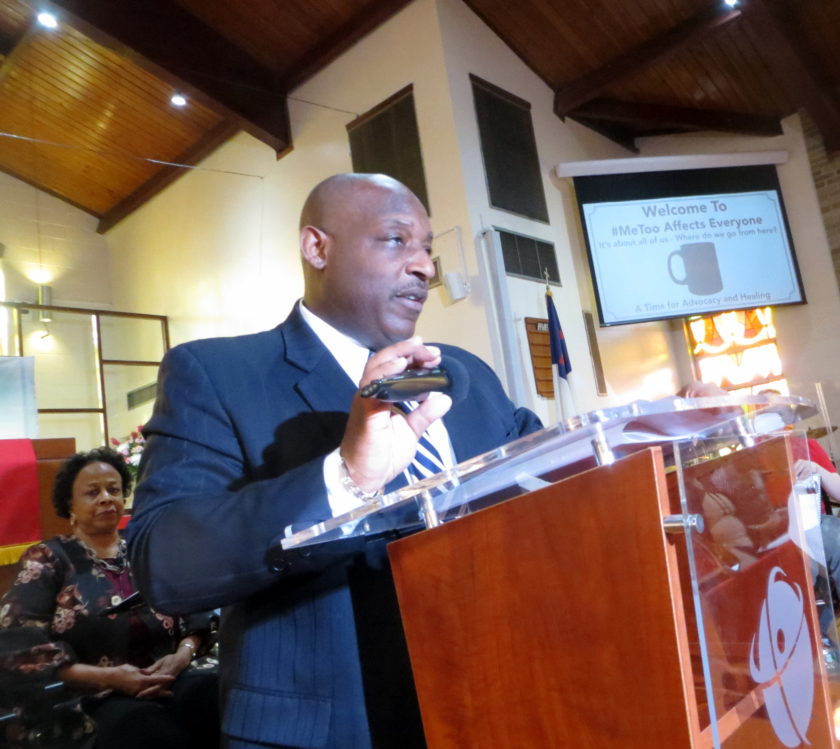
BY HILLARY VIDER
SPECIAL TO NORTHERN VALLEY PRESS
ENGLEWOOD, N.J.—“In light of the recent outpouring of revelations about sexual abuse, the question arises, “How can parents raise strong girls and responsible boys?”
That was the theme of the “#MeToo Affects Everyone” forum with a panel of experts that took place on March 30 at the Ebenezer Baptist Church in Englewood.
The forum was led by Defining Moment Foundation President Sharon R. Bernstein, Ph.D.
“This event is to raise awareness for gender equality, and we are seeking donations to the ECDC Summer Enrichment Camp at the Church in which the Defining Moment Foundation is a collaborative partner,” Bernstein said. “This nine-week program educates children and helps promote positive attitudes towards gender equality.”
Bernstein went on to explain, “The purpose of today’s program is to shed light upon the #MeToo movement and discuss ways we can positively influence people and find ways to progress as a society.”
All of the speakers supported that goal. They included: Judge Sandra Ann Robinson; speech pathologist and author, Jeannette Curtis-Rideau; attorney Eddie Raynord Hadden; global justice advocate Charlotte Bennett-Schoen; Executive Director of the Teaneck International Film Festival Jeremy Lentz; Executive Client Specialist Yvonne Holder; and millennial game designer Ben King. The panel discussion was moderated by Bernstein.
The program contained tips for parents and guardians on “consent,” as well as how to raise strong girls and strong boys in the #MeToo era, plus hotlines for sexual abuse.
For copies of these materials, contact Bernstein at: (201) 364- 4322 or email her at: sharonrbernstein@definingmomentfoundation.org.
Bergen County Sheriff Anthony Cureton gave the introduction. He related that the sheriff’s office has a mission to address and eliminate sexual abuse, rape and sexual harassment of people of all ages and all races.
“This problem has remained silent all too long!” he declared.
Rev. Preston E. Thompson Jr. welcomed the large audience that included men as well as women.
“I believe it’s important to have these conversations at the church,” he said. “The truth is that sexual assault and violence is occurring in the church and we must create opportunities to facilitate healing and wholeness for the victims.”
With great emotion and tears welling up in her eyes, Bernstein spoke about her own sexual abuse ordeal.
“I, too, am #MeToo. My experience happened in the seventh grade while a student in a private school for girls. My abuser, the school principal, was never punished and continued in his esteemed role at the school for many years after I graduated. Even though my family knew the truth, I was not allowed to talk about it,” Bernstein said.
“So, I remained silent for over 50 years. I do not want any young person today to ever carry that burden of silence. This is a time to share your personal truth and recognize the great opportunities today for both advocacy and healing through education,” she said. “#Me Too affects all of us!”
Bernstein then introduced the panelists, who stated their compelling reasons for participating.
Robinson said, “I accepted the invitation to join the panel with the understanding that I would insert legal perspectives and current law on sexual assault and harassment based on court cases handled. I believe open discussions that add knowledge about sexual abuse, sexual assault and harassment assist with eradicating stigmas created due to no fault of the victim.”
Bennett-Schoen was also eager to share her expertise: “My role on the #MeToo panel relates to my experience working with NGOs in southeast Asia, as well as working for the Bergen County Domestic Violence Agency. The issue of domestic violence and abuse of women was addressed in grants received by the NGOs. Empowering women, helping adolescent girls to continue in school, strengthening families all link to the global impact of #MeToo. It is a sea change of conversations and expectations.”
Curtis-Rideau said, “It is important that we all understand that the #MeToo Movement affects all of us in the community. It impacts girls, women, boys, men, and members of the LGBTQ community as well as an often forgotten population of our seniors. Educating the total community of this movement’s purpose is essential. As a person who has mentored our young people from elementary to high school, it is imperative that we provide them with accurate information and tools which empower them to protect themselves, give them the confidence to come forward if ever needed, provide a safe place and platform to keep them from becoming a victim.”
Hadden revealed, “As a man, I am particularly appreciative of serving on this #MeToo panel. I am here to listen and to contribute. I live by two basic rules. ‘Love others as I love myself’ and ‘Treat others as I want to be treated’ Everything else then falls into its proper place.”
Lentz said he was honored to be part of the forum.
“It’s a pleasure to participate on the panel and represent the LGBTQ community,” he said.
Game designer King said, “I believe I can lend perspectives which often get unheard in the discussion around #MeToo, thanks to my background and the time I’ve spent researching. I hope I can promote the empowerment of people who have experienced sexual misconduct and perhaps act as a bridge between those who promote the movement and those who distrust it.”
Bernstein, herself, exemplified the forum’s theme of “#MeToo Affects Everyone.”
“I cannot think of anything more systemically connected to bullying than the sexual intimidation, sexual assault and sexual harassment of young innocent children in our communities.”
An enlightening overview of the #MeToo movement was given, beginning in 1997, when Tarana Burke listened to a 13-year-old girl who had been sexually abused. As a result, Burke started the #MeToo campaign. Ten years later, Burke created Just Be Inc., a nonprofit organization that helps victims of sexual harassment and assault. She sought out resources, and gave her movement a name: “Me Too.”
A milestone was reached in October 2017, when actress Alyssa Milano accused movie mogul Harvey Weinstein of rape and sent out a tweet with the hashtag #MeToo with a link to Burke’s organization. Facebook reported that in less than 24 hours, 4.7 million people around the world engaged in the “Me too” conversation, with more than 12 million posts, comments and reactions. According to Facebook, more than 45% of people in the United States are friends with someone who’s posted a message with the words “Me too.”

Many questions
Bernstein posed specific questions to the panelists. She asked Rideau how mothers who work full time can protect their children from sexual predators, in school, at home and when returning from school. The point was reiterated that sexual abuse is about the power. As such, young people are particularly at risk.
Rideau advised that parents should ensure that their children always stay with a group and they should teach them to speak up when someone does something inappropriate.
Holder added, “I taught my 4-year-old daughter about her private body parts and she was so excited to learn!”
Holder read data about current rape incidence: one in five women and one in 16 men are sexually assaulted while attending college; one in three women and one in 10 men will experience sexual violence in their lifetime; 51 percent of the women and 62 percent of the men who were raped knew their attackers.
Even more shocking is the large number of children who are raped before the age of 10. For example, 27 percent of men were 10 or under when they were first raped. The most stringent point was that between 63 percent and 90 percent of all sexual assaults go unreported, making rape the number one most underreported crime.
Holder also brought up the subject of celebrities, such as Bill Cosby, who have gotten away with sexual abuse for many years because of their fame and financial resources and the stigma of shame and disbelief their victims fear.
Bennett-Schoen related that sexual abuse is global and her experiences in India and other Southeast Asian countries bear that out. She was also pleased to report that the Nobel Peace Prize for 2018 was awarded to Denis Mukwege and Nadia Murad for their efforts to end the use of sexual violence as a weapon of war and armed conflict.
Rideau raised the problem of sexual abuse of the elderly, particularly isolated people in assisted living and health care facilities. One precaution she advised to people with elderly family members at these facilities is to visit at different times and check on them as often as possible to ensure their wellbeing.
Lentz spoke about the sexual abuse of members of the LGBTQ community, people who are especially vulnerable. Lentz is proud that the Teaneck Film Festival is currently showcasing a film on this subject, and both he and King said that educating young people about respecting boundaries is essential.
Education was, in fact, a key focus of the panel discussion.
“Our young men and women have to understand proper behavior and what consent is and is not, i.e., that no really means no!” Rideau said.
Judge Robinson interjected a positive note in the conversation by pointing out that Pope Francis just issued sweeping new sex abuse legislation for the Vatican City and Vatican diplomats that requires the immediate reporting of all allegations to Vatican prosecutors. She also announced that in the New Jersey State Senate, the statute of limitations on sexual assault allegations was expanded from two years to seven years by a vote of 32 to 1.
Following the panel discussion, there was a question and answer period in which audience members shared personal experiences and looked to the experts for guidance on a number of issues. National Association for the Advancement of Colored People Bergen County President Jeff Carter asserted that there has to be funding for shelters that help sexual abuse victims and everyone agreed.
The audience also agreed that we need to educate young people to protect themselves and speak out against sexual abuse of themselves and their peers.
Rideau summed up that consensus: “We have enabled predators for a very long time, allowing them to put the fear of silence in their victims. But, now we can empower people, even people as young as 4 years old, and we can hear their stories.”
